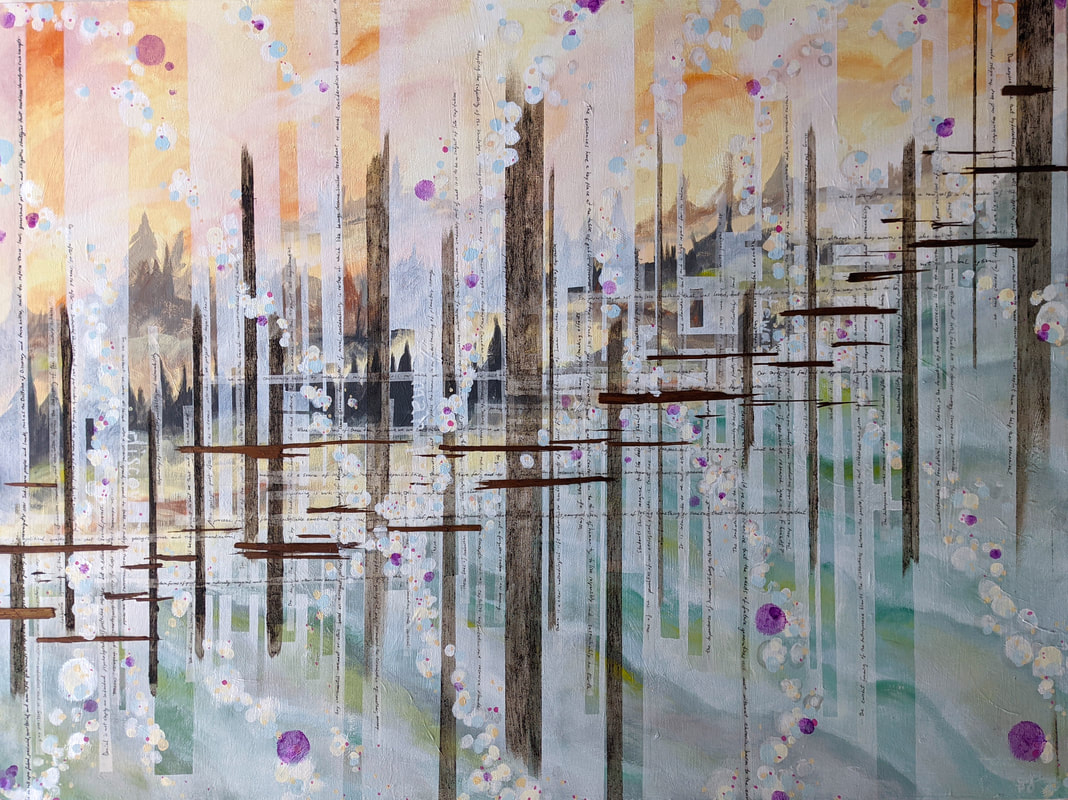Sandra Johnstone
Mournings
Artist Statement
Mournings (2020) emerged through a research-from-creation process (Loveless, 2019) to investigate the entangled moral dimensions of continuing to prepare undergraduate geoscience students to pursue careers in hydrocarbon extraction, given the anthropogenic climate crisis (IPCC, 2018). This piece documents my engagement with critical literature on socioenvironmental justice. I used layers of paint, collage to map and weave together the unwieldy and complex experience of mourning that encompasses both ecological grief (Cunsolo Willox, 2012), ambiguous grief resulting from the disruptions of constituting disciplinary stories, and the loss of “lovely knowledge” in adopting a non-innocent standpoint (Lather, 2007, p. 13).
References:
Cunsolo Willox, A. (2012). Climate change as the work of mourning. Ethics and the Environment, 17(2), 137–164.
IPCC. (2018). Summary for policymakers. In V. Masson-Delmotte, P. Zhai, H. O. Porter, D. Roberts, J. Skea, P. R. Shukla, A. Pirani, W. Moufouma-Okla, C. Pean, R. Pidcock, S. Conners, J. B. R. Matthews, Y. Chen, X. Zhou, M. I. Gomis, E. Lonnoy, T. Maycock, M. Tignor & T. Waterfield (Eds.), Global Warming of 1.5C. An IPCC Special Report on the impacts of global warming of 1.5C above pre-industrial levels and related global greenhouse gas emission pathways, in the context of strengthening the global response to the threat of climate change. https://www.ipcc.ch/site/assets/uploads/sites/2/2019/05/SR15_SPM_version_report_LR.pdf
Lather, P. (2007). Getting lost: Feminist efforts toward a double(d) science. State University of New York Press.
Loveless, N. (2019). How to make art at the end of the world: A manifesto for research-creation. Duke University Press.
Mournings (2020) emerged through a research-from-creation process (Loveless, 2019) to investigate the entangled moral dimensions of continuing to prepare undergraduate geoscience students to pursue careers in hydrocarbon extraction, given the anthropogenic climate crisis (IPCC, 2018). This piece documents my engagement with critical literature on socioenvironmental justice. I used layers of paint, collage to map and weave together the unwieldy and complex experience of mourning that encompasses both ecological grief (Cunsolo Willox, 2012), ambiguous grief resulting from the disruptions of constituting disciplinary stories, and the loss of “lovely knowledge” in adopting a non-innocent standpoint (Lather, 2007, p. 13).
References:
Cunsolo Willox, A. (2012). Climate change as the work of mourning. Ethics and the Environment, 17(2), 137–164.
IPCC. (2018). Summary for policymakers. In V. Masson-Delmotte, P. Zhai, H. O. Porter, D. Roberts, J. Skea, P. R. Shukla, A. Pirani, W. Moufouma-Okla, C. Pean, R. Pidcock, S. Conners, J. B. R. Matthews, Y. Chen, X. Zhou, M. I. Gomis, E. Lonnoy, T. Maycock, M. Tignor & T. Waterfield (Eds.), Global Warming of 1.5C. An IPCC Special Report on the impacts of global warming of 1.5C above pre-industrial levels and related global greenhouse gas emission pathways, in the context of strengthening the global response to the threat of climate change. https://www.ipcc.ch/site/assets/uploads/sites/2/2019/05/SR15_SPM_version_report_LR.pdf
Lather, P. (2007). Getting lost: Feminist efforts toward a double(d) science. State University of New York Press.
Loveless, N. (2019). How to make art at the end of the world: A manifesto for research-creation. Duke University Press.
|
Sandra Johnstone
Lakehead University Sandra Johnstone is a doctoral student in Educational Studies at Lakehead University, researching the social worlds of geoscience education. Her art is influenced by geological materials and processes, drawing from her MSc in Earth Science (University of Waterloo, 2003) and more than a decade as a geoscience educator. |

